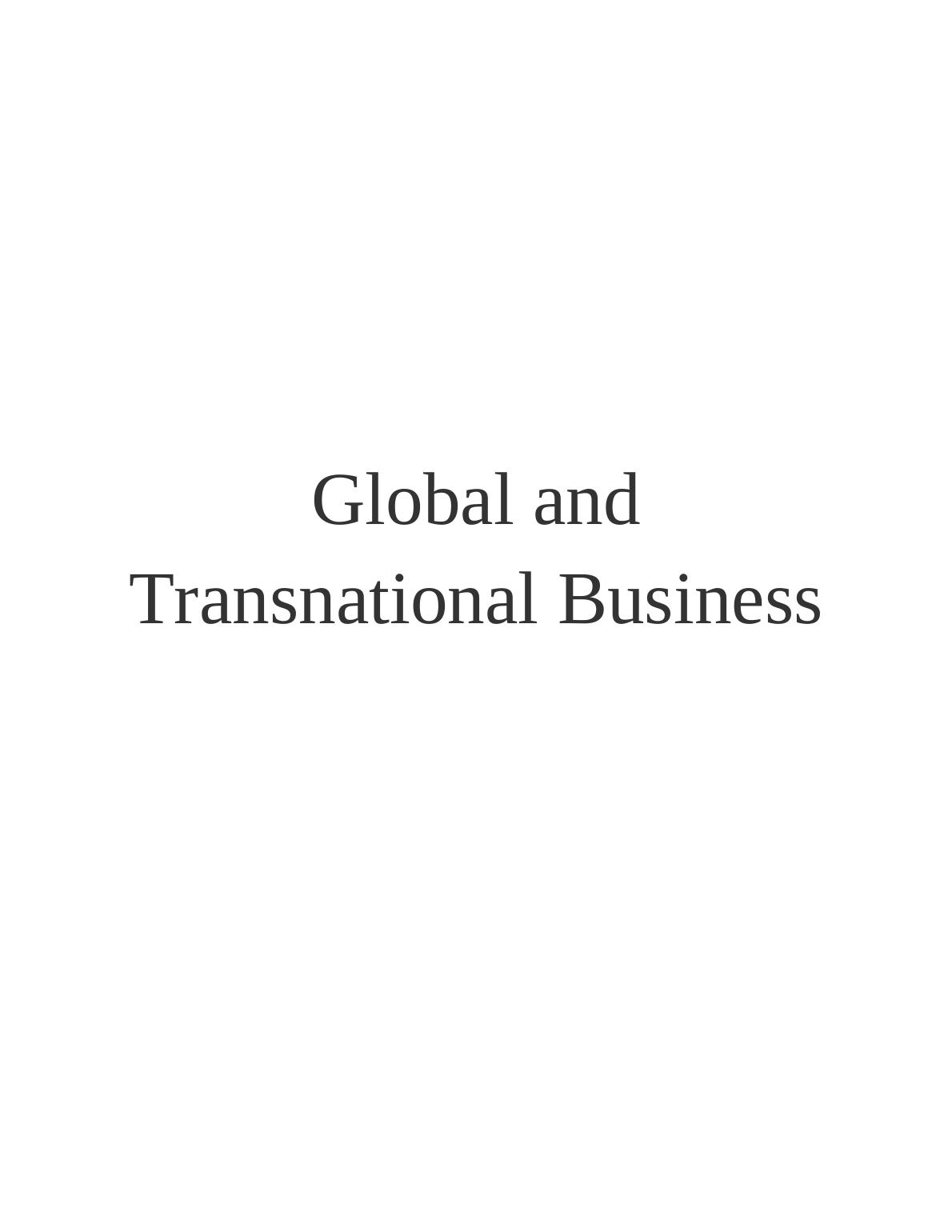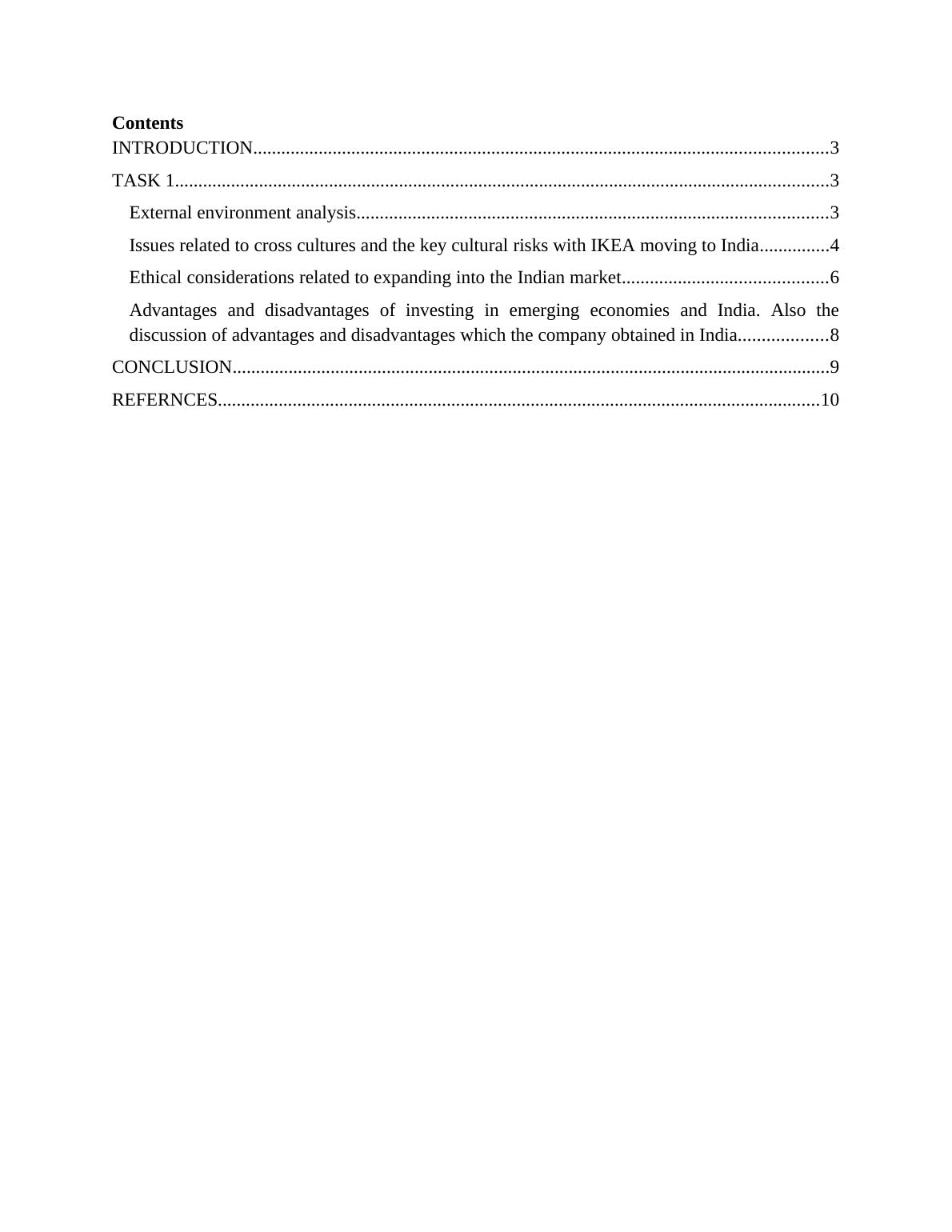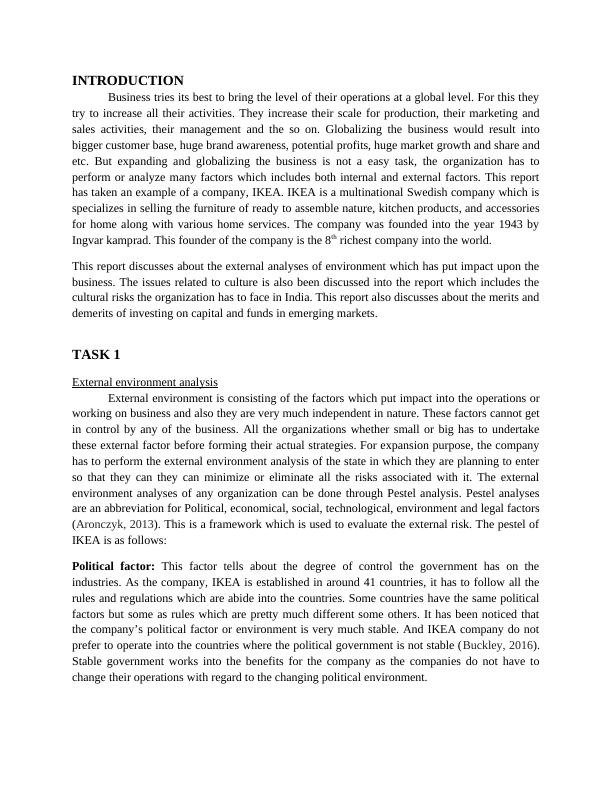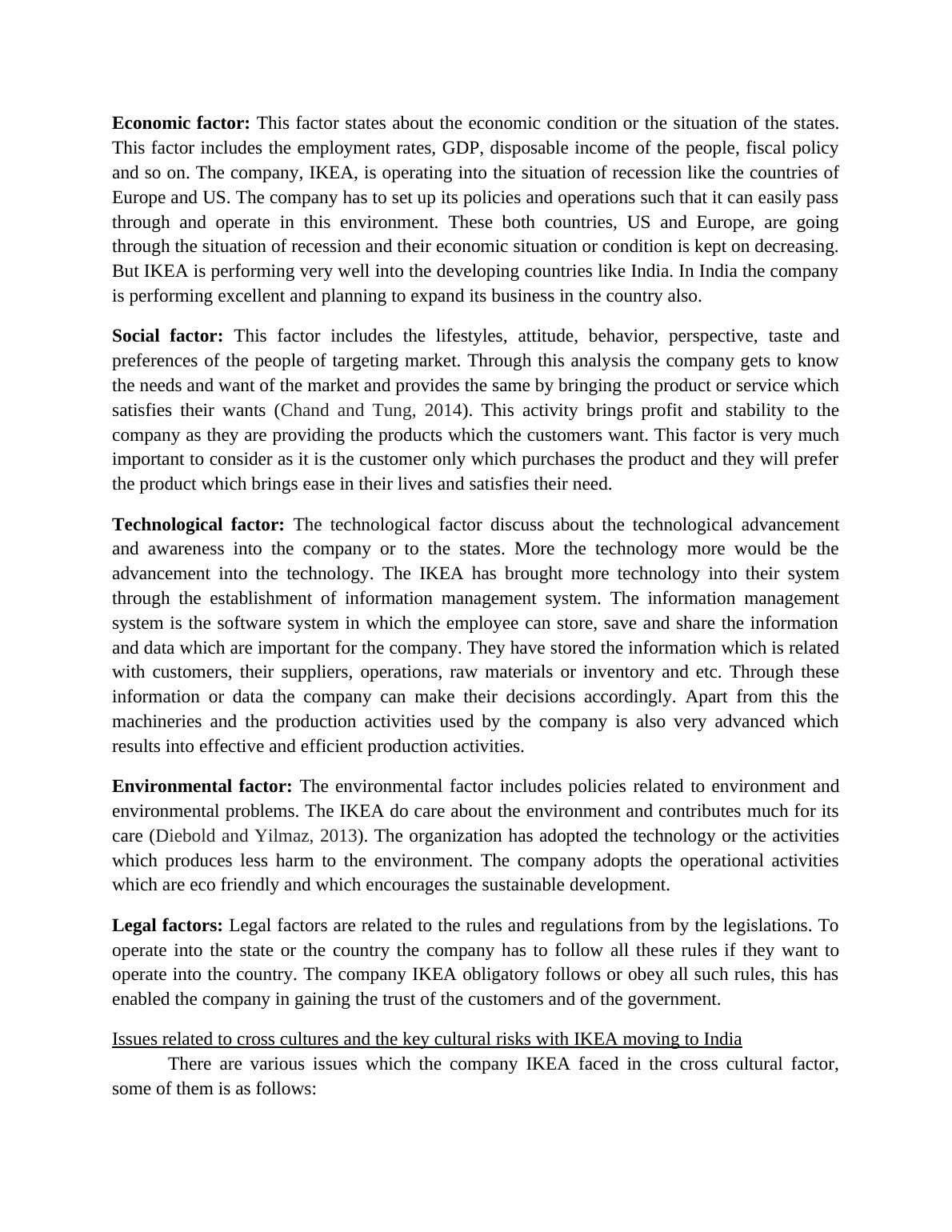Global and Transnational Business
Added on 2023-01-10
11 Pages4387 Words73 Views
Global and
Transnational Business
Transnational Business

Contents
INTRODUCTION...........................................................................................................................3
TASK 1............................................................................................................................................3
External environment analysis.....................................................................................................3
Issues related to cross cultures and the key cultural risks with IKEA moving to India...............4
Ethical considerations related to expanding into the Indian market............................................6
Advantages and disadvantages of investing in emerging economies and India. Also the
discussion of advantages and disadvantages which the company obtained in India...................8
CONCLUSION................................................................................................................................9
REFERNCES.................................................................................................................................10
INTRODUCTION...........................................................................................................................3
TASK 1............................................................................................................................................3
External environment analysis.....................................................................................................3
Issues related to cross cultures and the key cultural risks with IKEA moving to India...............4
Ethical considerations related to expanding into the Indian market............................................6
Advantages and disadvantages of investing in emerging economies and India. Also the
discussion of advantages and disadvantages which the company obtained in India...................8
CONCLUSION................................................................................................................................9
REFERNCES.................................................................................................................................10

INTRODUCTION
Business tries its best to bring the level of their operations at a global level. For this they
try to increase all their activities. They increase their scale for production, their marketing and
sales activities, their management and the so on. Globalizing the business would result into
bigger customer base, huge brand awareness, potential profits, huge market growth and share and
etc. But expanding and globalizing the business is not a easy task, the organization has to
perform or analyze many factors which includes both internal and external factors. This report
has taken an example of a company, IKEA. IKEA is a multinational Swedish company which is
specializes in selling the furniture of ready to assemble nature, kitchen products, and accessories
for home along with various home services. The company was founded into the year 1943 by
Ingvar kamprad. This founder of the company is the 8th richest company into the world.
This report discusses about the external analyses of environment which has put impact upon the
business. The issues related to culture is also been discussed into the report which includes the
cultural risks the organization has to face in India. This report also discusses about the merits and
demerits of investing on capital and funds in emerging markets.
TASK 1
External environment analysis
External environment is consisting of the factors which put impact into the operations or
working on business and also they are very much independent in nature. These factors cannot get
in control by any of the business. All the organizations whether small or big has to undertake
these external factor before forming their actual strategies. For expansion purpose, the company
has to perform the external environment analysis of the state in which they are planning to enter
so that they can they can minimize or eliminate all the risks associated with it. The external
environment analyses of any organization can be done through Pestel analysis. Pestel analyses
are an abbreviation for Political, economical, social, technological, environment and legal factors
(Aronczyk, 2013). This is a framework which is used to evaluate the external risk. The pestel of
IKEA is as follows:
Political factor: This factor tells about the degree of control the government has on the
industries. As the company, IKEA is established in around 41 countries, it has to follow all the
rules and regulations which are abide into the countries. Some countries have the same political
factors but some as rules which are pretty much different some others. It has been noticed that
the company’s political factor or environment is very much stable. And IKEA company do not
prefer to operate into the countries where the political government is not stable (Buckley, 2016).
Stable government works into the benefits for the company as the companies do not have to
change their operations with regard to the changing political environment.
Business tries its best to bring the level of their operations at a global level. For this they
try to increase all their activities. They increase their scale for production, their marketing and
sales activities, their management and the so on. Globalizing the business would result into
bigger customer base, huge brand awareness, potential profits, huge market growth and share and
etc. But expanding and globalizing the business is not a easy task, the organization has to
perform or analyze many factors which includes both internal and external factors. This report
has taken an example of a company, IKEA. IKEA is a multinational Swedish company which is
specializes in selling the furniture of ready to assemble nature, kitchen products, and accessories
for home along with various home services. The company was founded into the year 1943 by
Ingvar kamprad. This founder of the company is the 8th richest company into the world.
This report discusses about the external analyses of environment which has put impact upon the
business. The issues related to culture is also been discussed into the report which includes the
cultural risks the organization has to face in India. This report also discusses about the merits and
demerits of investing on capital and funds in emerging markets.
TASK 1
External environment analysis
External environment is consisting of the factors which put impact into the operations or
working on business and also they are very much independent in nature. These factors cannot get
in control by any of the business. All the organizations whether small or big has to undertake
these external factor before forming their actual strategies. For expansion purpose, the company
has to perform the external environment analysis of the state in which they are planning to enter
so that they can they can minimize or eliminate all the risks associated with it. The external
environment analyses of any organization can be done through Pestel analysis. Pestel analyses
are an abbreviation for Political, economical, social, technological, environment and legal factors
(Aronczyk, 2013). This is a framework which is used to evaluate the external risk. The pestel of
IKEA is as follows:
Political factor: This factor tells about the degree of control the government has on the
industries. As the company, IKEA is established in around 41 countries, it has to follow all the
rules and regulations which are abide into the countries. Some countries have the same political
factors but some as rules which are pretty much different some others. It has been noticed that
the company’s political factor or environment is very much stable. And IKEA company do not
prefer to operate into the countries where the political government is not stable (Buckley, 2016).
Stable government works into the benefits for the company as the companies do not have to
change their operations with regard to the changing political environment.

Economic factor: This factor states about the economic condition or the situation of the states.
This factor includes the employment rates, GDP, disposable income of the people, fiscal policy
and so on. The company, IKEA, is operating into the situation of recession like the countries of
Europe and US. The company has to set up its policies and operations such that it can easily pass
through and operate in this environment. These both countries, US and Europe, are going
through the situation of recession and their economic situation or condition is kept on decreasing.
But IKEA is performing very well into the developing countries like India. In India the company
is performing excellent and planning to expand its business in the country also.
Social factor: This factor includes the lifestyles, attitude, behavior, perspective, taste and
preferences of the people of targeting market. Through this analysis the company gets to know
the needs and want of the market and provides the same by bringing the product or service which
satisfies their wants (Chand and Tung, 2014). This activity brings profit and stability to the
company as they are providing the products which the customers want. This factor is very much
important to consider as it is the customer only which purchases the product and they will prefer
the product which brings ease in their lives and satisfies their need.
Technological factor: The technological factor discuss about the technological advancement
and awareness into the company or to the states. More the technology more would be the
advancement into the technology. The IKEA has brought more technology into their system
through the establishment of information management system. The information management
system is the software system in which the employee can store, save and share the information
and data which are important for the company. They have stored the information which is related
with customers, their suppliers, operations, raw materials or inventory and etc. Through these
information or data the company can make their decisions accordingly. Apart from this the
machineries and the production activities used by the company is also very advanced which
results into effective and efficient production activities.
Environmental factor: The environmental factor includes policies related to environment and
environmental problems. The IKEA do care about the environment and contributes much for its
care (Diebold and Yilmaz, 2013). The organization has adopted the technology or the activities
which produces less harm to the environment. The company adopts the operational activities
which are eco friendly and which encourages the sustainable development.
Legal factors: Legal factors are related to the rules and regulations from by the legislations. To
operate into the state or the country the company has to follow all these rules if they want to
operate into the country. The company IKEA obligatory follows or obey all such rules, this has
enabled the company in gaining the trust of the customers and of the government.
Issues related to cross cultures and the key cultural risks with IKEA moving to India
There are various issues which the company IKEA faced in the cross cultural factor,
some of them is as follows:
This factor includes the employment rates, GDP, disposable income of the people, fiscal policy
and so on. The company, IKEA, is operating into the situation of recession like the countries of
Europe and US. The company has to set up its policies and operations such that it can easily pass
through and operate in this environment. These both countries, US and Europe, are going
through the situation of recession and their economic situation or condition is kept on decreasing.
But IKEA is performing very well into the developing countries like India. In India the company
is performing excellent and planning to expand its business in the country also.
Social factor: This factor includes the lifestyles, attitude, behavior, perspective, taste and
preferences of the people of targeting market. Through this analysis the company gets to know
the needs and want of the market and provides the same by bringing the product or service which
satisfies their wants (Chand and Tung, 2014). This activity brings profit and stability to the
company as they are providing the products which the customers want. This factor is very much
important to consider as it is the customer only which purchases the product and they will prefer
the product which brings ease in their lives and satisfies their need.
Technological factor: The technological factor discuss about the technological advancement
and awareness into the company or to the states. More the technology more would be the
advancement into the technology. The IKEA has brought more technology into their system
through the establishment of information management system. The information management
system is the software system in which the employee can store, save and share the information
and data which are important for the company. They have stored the information which is related
with customers, their suppliers, operations, raw materials or inventory and etc. Through these
information or data the company can make their decisions accordingly. Apart from this the
machineries and the production activities used by the company is also very advanced which
results into effective and efficient production activities.
Environmental factor: The environmental factor includes policies related to environment and
environmental problems. The IKEA do care about the environment and contributes much for its
care (Diebold and Yilmaz, 2013). The organization has adopted the technology or the activities
which produces less harm to the environment. The company adopts the operational activities
which are eco friendly and which encourages the sustainable development.
Legal factors: Legal factors are related to the rules and regulations from by the legislations. To
operate into the state or the country the company has to follow all these rules if they want to
operate into the country. The company IKEA obligatory follows or obey all such rules, this has
enabled the company in gaining the trust of the customers and of the government.
Issues related to cross cultures and the key cultural risks with IKEA moving to India
There are various issues which the company IKEA faced in the cross cultural factor,
some of them is as follows:

End of preview
Want to access all the pages? Upload your documents or become a member.
Related Documents
Strategic Management: Analysis, Options, and Implementationlg...
|31
|7248
|149
Global Business Environmentlg...
|11
|1285
|57
Business Strategy: Analysis of IKEA's Internal Environment and Competitive Positioninglg...
|14
|4248
|56
Impact of Macro-Environment on Business Strategies of IKEAlg...
|16
|4628
|35
International Business Environmentlg...
|22
|3682
|441
International Business and Global Marketslg...
|14
|2832
|434
